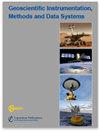巴西赤道磁强计站马卡帕:安装、数据提供和温度校正方法
IF 2.3
4区 地球科学
Q3 GEOSCIENCES, MULTIDISCIPLINARY
引用次数: 0
摘要
摘要在过去的 60 年中,磁赤道的最大位移(向北移动了约 1100 公里)发生在巴西的纵向区域。2012 年,磁赤道经过巴西北部的塔图奥卡磁性观测站(TTB),并继续向北移动。由于磁赤道的水平地磁场几何形状,电离层中产生了增强的电流--即所谓的赤道电射流(EEJ)。在距离磁赤道 ± 3 度的范围内可以观测到 EEJ 的磁场效应,磁场观测站记录到这里 H 分量的日变化被放大。为了跟踪这一现象的空间和时间变化,在距 TTB 西北约 350 公里的马卡帕(MAA)安装了一个新的磁强计站。本文介绍了 MAA 站从 2019 年 11 月至 2021 年 9 月的设置和数据分析情况。由于其特殊配置,我们开发了一种对矢量磁强计数据进行温度校正的方法。本文章由计算机程序翻译,如有差异,请以英文原文为准。
Macapá, a Brazilian equatorial magnetometer station: installation, data availability and methods for temperature correction
Abstract. In the last 60 years, the largest displacement of the magnetic equator (by about 1100 km northwards) occurred in the Brazilian longitudinal sector. The magnetic equator passed by Tatuoca magnetic observatory (TTB) in northern Brazil in 2012 and continues to move northward. Due to the horizontal geomagnetic field geometry at the magnetic equator, enhanced electric currents in the ionosphere are produced – the so called equatorial electrojet (EEJ). The magnetic effect of the EEJ is observed in the range of ± 3 degrees from the magnetic equator, where magnetic observatories record an amplified daily variation of the H component. In order to track the spatial and temporal variation of this phenomena, a new magnetometer station was installed in Macapá (MAA), which is about 350 km northwest from TTB. In this paper, we present the setup and data analysis of MAA station from 11/2019 until 09/2021. Because of its special configuration, we develop a method for temperature correction of the vector magnetometer data.
求助全文
通过发布文献求助,成功后即可免费获取论文全文。
去求助
来源期刊

Geoscientific Instrumentation Methods and Data Systems
GEOSCIENCES, MULTIDISCIPLINARYMETEOROLOGY-METEOROLOGY & ATMOSPHERIC SCIENCES
CiteScore
3.70
自引率
0.00%
发文量
23
审稿时长
37 weeks
期刊介绍:
Geoscientific Instrumentation, Methods and Data Systems (GI) is an open-access interdisciplinary electronic journal for swift publication of original articles and short communications in the area of geoscientific instruments. It covers three main areas: (i) atmospheric and geospace sciences, (ii) earth science, and (iii) ocean science. A unique feature of the journal is the emphasis on synergy between science and technology that facilitates advances in GI. These advances include but are not limited to the following:
concepts, design, and description of instrumentation and data systems;
retrieval techniques of scientific products from measurements;
calibration and data quality assessment;
uncertainty in measurements;
newly developed and planned research platforms and community instrumentation capabilities;
major national and international field campaigns and observational research programs;
new observational strategies to address societal needs in areas such as monitoring climate change and preventing natural disasters;
networking of instruments for enhancing high temporal and spatial resolution of observations.
GI has an innovative two-stage publication process involving the scientific discussion forum Geoscientific Instrumentation, Methods and Data Systems Discussions (GID), which has been designed to do the following:
foster scientific discussion;
maximize the effectiveness and transparency of scientific quality assurance;
enable rapid publication;
make scientific publications freely accessible.
 求助内容:
求助内容: 应助结果提醒方式:
应助结果提醒方式:


